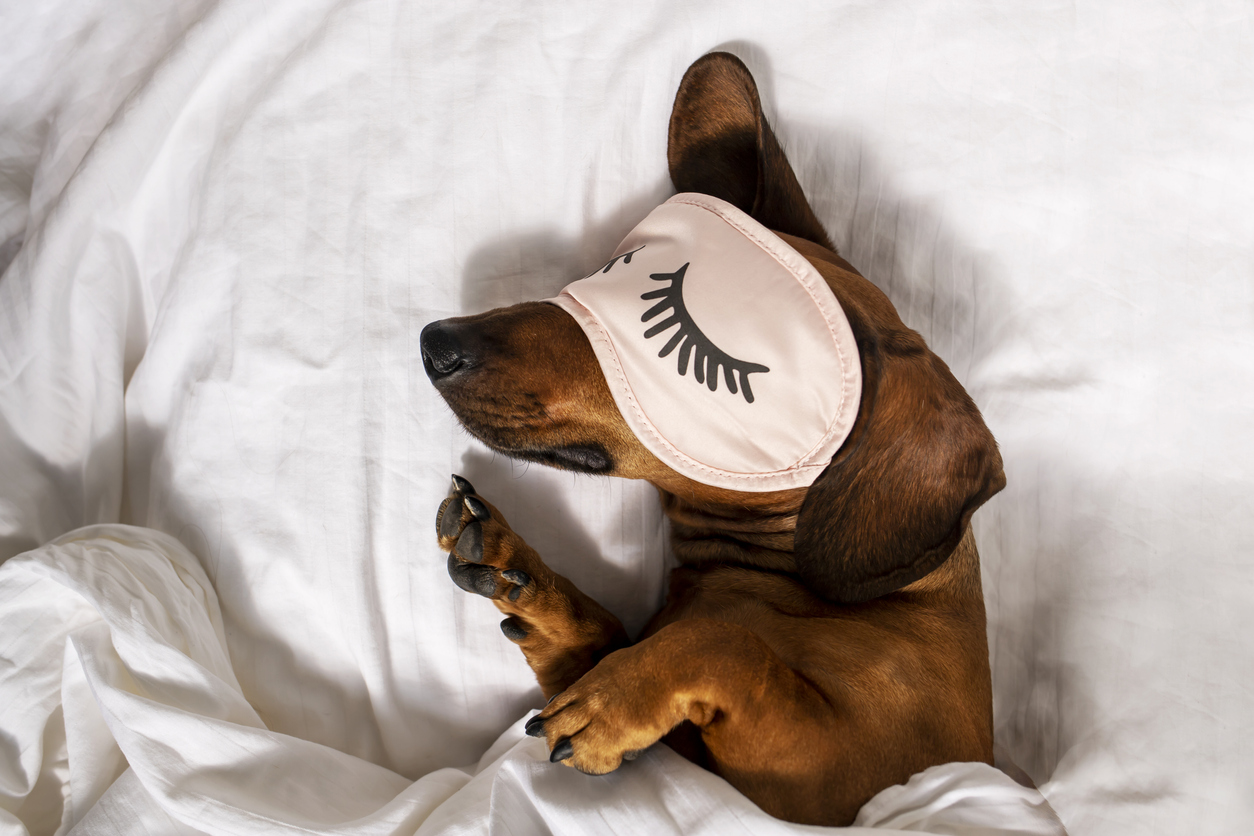On an average day at home, when he’s not busy eating, chances are your dog is probably settled in for a comfy snooze! Haven’t we all gazed enviously at our sleeping dogs and thought “I want to be you” !? Sprawled out on a giant soft dog bed for hours every day, or just awake and chilling on the couch, watching us scurry around the house trying to keep up with life. I think we can all agree that most pet dogs in the United States have it pretty good!
While they are not just being lazy, sleeping is a necessary and natural process for animals and is essential to good health. Humans could probably even take a few cues from our dog’s ability to curl up and recharge! After all, dogs and humans alike experience both slow-wave (NonREM) and REM sleep. During the sleep cycle, the relaxed bodies of humans and animals work to restore and repair muscles, create new brain pathways, consolidate memories, and process the new information gathered during the day. Sleep also contributes to a healthy heart, immune system, weight maintenance, growth, and development. Even though sleep patterns between species are varied, all animals require sleep to stay healthy. Dogs happen to be very good at seeking out that comfy spot, curling up and nodding off periodically throughout their day!
We have established that sleep is healthy, but what is it about dogs that makes them want to sleep so much ? And when they are sleeping, do they dream? What illnesses cause an increase or decrease in sleep? Let’s take a deeper look into a dog’s sleeping habits.
Sleeping for Long Hours is Normal for a Dog
Being ancestors of large carnivores near the “top of the food chain”, dogs can afford this excessive sleeping due to the consumption of calorie-dense meals and free of the fear of “being attacked” (chapter 10 “Sleep in Animals” Kryger, Principles and Practice of Sleep Medicine ). Spending 50% (12 hours!) of their day sleeping, 30% (7 hours!) of their day relaxing awake, and 20% (4 hours!) of their day engaging in activities is pretty normal for the average dog. Dogs are polyphasic sleepers and will catch some zzz’s sporadically through the day, as well as longer periods overnight. The amount of sleep a particular dog needs depends on age, breed, size, activity level, personality, and health.
Puppies, Large Breeds, and Senior Dogs Sleep More
Does it seem like your new puppy is conked out all the time? An average of 18-20 hours per day spent sleeping may seem extreme but is pretty normal for a growing puppy! They play hard and sleep hard, and it’s all totally normal. Your puppy’s brain and body are developing rapidly and much energy is spent zooming around, chewing everything in sight, learning, and soaking in the world around her. At the same time, she is also creating bone, muscle, internal organs, nerve, and brain tissue. All that mental and physical growth calls for napping almost hourly for an average duration of 30 minutes to 2 hours.
Puppies do thrive when their day is scheduled and routines are established by pet parents. This predictability allows ample time for eating, playing, and sleeping. Puppies tend to seek out and spend most of their dozing time in cozy den-like environments like a kennel or crate. Crate training while young is a great way to ensure that your pup finds a comfortable and safe place to call their own and catch some much-needed zzz’s.
Senior dogs aged 7+ (depending on the breed) tend to start slowing down and increasing the time spent sleeping and resting daily as well. We may always view them as our bouncing baby pup, but at an advanced age, senior minds and bodies are changing and becoming less adaptable. You’re not imagining things-your aging dog’s energy reserves are just not what they used to be. While the average healthy adult dog spends 12-14 hours sleeping per day, an older dog will spend even more hours relaxing and asleep.
Large breed dogs (with the exception of very active, high-drive breeds) and more sedentary dog breeds, like Bernese Mountain Dogs, Mastiffs, Great Danes, and English Bulldogs, also have the tendency to sleep more than smaller dog breeds. This is mostly due to their size and the amount of energy exerted moving their larger body around, as well as genetics dictating their motivation and desire to be active (ie, they tend to be big and lazy!).
Active, Hyper-Vigilant, High-Drive Dogs Sleep Less
Just as breeding has created dogs that prefer to veg on the couch as often as possible, there are also breeds that are highly motivated and driven, require lots of activity, and have very active minds. These breeds require a tremendous amount of exercise and activity to drain their daily battery (Belgian Malinois, Border Collie, German Shepherd-I am talking about you guys!). If they do not receive the needed level of exercise and mental stimulation, instead of using downtime to curl up and relax, they may develop unhealthy obsessive habits like pacing, chewing, circling, and also start suffering from anxiety. Finding the right breed for your family’s lifestyle is key to the happiness of the dog and pet owner.
Do Dogs Dream?
Don’t we wish dogs could recount their dreams to us?! Chasing rabbits? Swimming through a pond of tennis balls? Chowing down in a room full of dog food? Since they can’t tell us what they experience, researchers have gathered evidence through sleep studies in animals indicating that indeed, dogs do dream! A 2001 study at the Massachusetts Institute of Technology showed that rats learning a maze during the day exhibited the same brain waves during REM sleep as they did during their time awake, exploring the maze. This, and many other studies, serves as evidence that they were likely processing their experience and dreaming about what they learned in the maze that day!
Body Movements While Sleeping
While animals sleep, consciousness is reduced and voluntary movement is dampened by parts of the brain. However, petparents are often startled when they witness their dog’s eyes dart around under their eyelids, hear them vocalize a range of sounds, see breathing that is shallow/fast/irregular, and watch their legs move or paddle like they are running. Thankfully, movements like these are considered totally normal! Your new puppy may simply be re-living the day’s events, processing the info their brain collected or taking part in his favorite activity in a dream!
Growing puppies who are absorbing a great deal of information every day, and some adult dogs too, will exhibit quite a bit of movement while sleeping! It is possible, yet rare, to observe (viral on YouTube) more extreme sleeping motions in a dog, that may end up resulting in violent movements, jumping up and running away (still unconscious and asleep), and subsequently waking up. While you may be entertained by videos of this “extreme sleeping,” it’s useful to remember that this is highly abnormal, and not to be expected from the average pup! A little paddling, whining and rapid breathing is much more common. Remember that in your pup’s dreams, he can chase all the bunnies he wants (even better than in real life!)!
Dreams Versus Seizure Activity
Often pet parents will witness these body movements and panic, wondering if their sweet pup is having a seizure. How can we tell the difference? Check out some of the main features of a seizure versus normal involuntary dream movements:
| Dream Movements | Seizure |
| Dog is sleeping | Dog is awake or asleep |
| Movements are brief, mild, and intermittent like paddling legs, shallow breathing patterns, and vocal sounds | Movements are stiff and rigid, often violent full body convulsions. Sometimes will urinate and defecate, and/or exhibit chewing motions (possibly even bite their tongue) |
| If woken, movements stop and pup will immediately become conscious and aware of surroundings | Remains unresponsive to owner, cannot be aroused from the event while it is occurring |
| Rises and walks normally when woken | After the seizure are often disoriented and walk abnormally for a period of time |
AskVet Tip: Waking a sleeping dog comes with risk of startling them and possibly causing them to reflexively bite. When waking a dog, it is suggested to clap, say their name loudly, or gently nudge their bed to get their attention. Children are especially vulnerable to dog bites when they attempt to pet, snuggle, and hug a sleeping dog.
When Changes in Sleep Patterns May Be a Sign of Illness
Are there some occasions when changes in your dog’s sleeping pattern potentially indicates that they are not feeling well? Unfortunately, yes: decreased energy and changes in sleeping patterns can be a sign of several health conditions in dogs. For this reason, it’s important to know what is normal for your dog-and to recognize if she deviates from her normal routine.
Not sure if your pup’s sleep pattern is healthy? To quantify how much sleep your pooch is getting per day, start to keep a “sleep log” and jot down how many hours they spend laying down, resting, and sleeping. Changes in sleep habits should be reported to your veterinarian so that they can perform a physical exam and consider some additional testing and x-rays. These tests will check out those internal body functions, searching for any abnormalities that could be causing your pup’s energy drain. Your dog’s age, breed, and normal activity level will be taken into account when compared to the sleep log results and physical exam findings to reveal some helpful information.
Difficulty Sleeping
Just like in humans, any condition that makes it more difficult to fall and to stay asleep can lead to additional health problems-and a diminished quality of life. Some of the most common causes of difficulty sleeping include pain (from arthritis, injury, or gastrointestinal upset), and difficulty breathing.
Clues that your dog may be experiencing pain and discomfort include hesitating to lay down or having difficulty getting up, not wanting or able to get out of bed, limping or taking abnormal steps once up, or urinating while laying down. You can imagine that if your dog is sore and can’t sleep as well, they may be trying to catch some more zzz’s throughout the day-leading to an increase in hours of sleeping, even though it’s of poor quality.
Snoring and irregular breathing while sleeping is a common feature of those cute little smooshed-nosed breeds like English Bulldogs, Frenchies, Bostons, etc, and can affect sleep quality. These breeds will snore due to a number of issues with their airways stemming from small nasal passages and windpipes, and extra skin in their throat. All of those structures relax and collapse further when they are sleeping, making it difficult for them to breathe and producing the snoring sounds that may keep you up at night. If your dog is an extreme snorer resulting in sleep apnea (he chokes, coughs, or wakes himself up with snores!), a physical exam with your vet is recommended. For our noisy breathers, surgery to correct some of these abnormalities and open up the airways may be necessary depending on severity.
Specific Illnesses Related to More or Less Sleep
There are health conditions that can be directly or indirectly related to your dog wanting to sleep and lay down more. They range from physical/mobility issues to mental issues, and some involve abnormalities of internal organs or the metabolism of your dog.
| Health Conditions Causing Increased Sleep | Health Conditions Causing Decreased or Fragmented Sleep |
| Hypothyroid | Stress and anxiety |
| Arthritis | Excessive snoring and sleep apnea (smooshed-face dogs) |
| Heart or Lung Disease | Canine Cognitive Dysfunction (senior dogs) |
| Internal organ dysfunction (often you may also see lethargy, decreased appetite, vomiting, diarrhea, coughing, etc) | Pain and internal discomfort |
| Narcolepsy (suddenly and inappropriately falls asleep) | Brain abnormalities |
Changes in sleep patterns accompanied by vomiting, diarrhea, lethargy, and less energy, are strong indications that something might be wrong and your pup is not feeling well. If you are noticing any of these changes and deviations from the normal routine, a physical examination with your veterinarian should be high on your priority list. On the flip side, sleeping less, pacing, drooling, seeming uncomfortable, increased aggression or changes in personality accompanying decreased sleep can also be an indicator that something internal may be going on.
What if it’s not a Medical Problem?
Boredom can also affect dogs! Dogs that are inactive will likely spend more time sleeping-and subsequently may also have issues with obesity too. Ample trips outdoors multiple times a day, attention from their pet parents, puzzle toys, dog walkers, daycares and outings, can help ensure that your pup is receiving plenty of mental stimulation to encourage appropriate daily amounts of activity and sleep.
Nighty-Night, Pups!
Next time you ponder the hours your pup spends snoozing, just keep in mind that sleeping at periods throughout the day is probably pretty normal and healthy for your precious pooch! Keeping a regular schedule for feeding, ensuring adequate daily exercise, and leaving time for regular naps will ensure that your pup is maintaining a healthy balance. Maintaining a routine is also helpful in determining when changes in your dog’s sleep patterns could indicate a health issue requiring a visit to your vet! Invest in some nice comfy beds, place them in your pup’s preferred sleeping spots, and let him drift off to dreamland and chase those imaginary bunnies to his heart’s content!
Our AskVet Veterinarians are available to discuss all of your pet’s needs 24 hours a day, 7 days a week. Whether you have an immediate need or are looking to improve your pet’s overall wellbeing, just sign into your account and one of our friendly and knowledgeable veterinary experts will attend to your needs, no appointment required!
Written by:
Alexa Waltz, DVM
Dr. Waltz was raised near the beaches of Southern California but has spent her adult life living all over the beautiful United States while serving in the military and as a military spouse. She left California for the first time to pursue a career as a veterinarian at Louisiana State University School of Veterinary Medicine and graduated as a Doctor of Veterinary Medicine in 2006. She was accepted into the US Army Health Professionals Scholarship Program during vet school and upon graduation spent her military years as a veterinarian in San Diego working for the US Marine Corps and US Navy Military Working Dog programs as well as caring for pets of service members. After her military service, she became a civilian veterinarian and continued as a small animal general practitioner at clinics in California, Rhode Island, Colorado, and Maryland. Dr Waltz loves to see her “in person” patients just as much as communicating with and assisting pet parents virtually on AskVet. Dr Waltz is also a Mom to 3 humans, 2 guinea pigs, and 1 Australian Shepherd and in her spare time she loves traveling, adventures, exercising, and doing just about anything out in nature!






